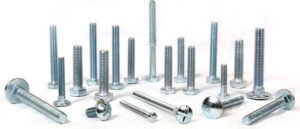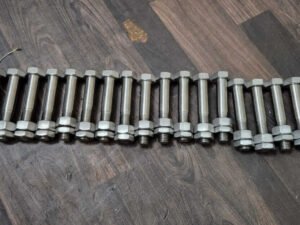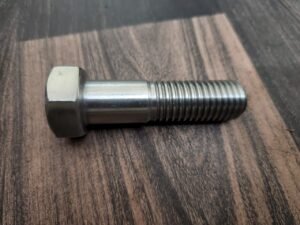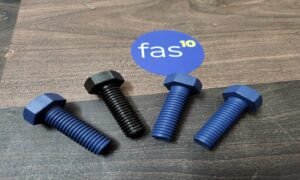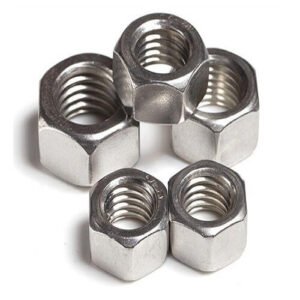
A2 70 and Grade 8.8 are two different standards used to specify the strength and performance characteristics of bolts and fasteners. A2 70 is a stainless steel grade commonly used in general applications, offering good corrosion resistance and moderate strength. On the other hand, Grade 8.8 refers to a metric bolt grade with a higher tensile strength and greater hardness, typically made of carbon steel. Understanding these standards is crucial for selecting the appropriate fasteners based on specific project requirements.
A2 70
A2-70 bolt grade renowned for its excellent corrosion resistance and moderate strength. It belongs to the A2 series, which denotes austenitic stainless steel with a composition primarily consisting of chromium (17-19%) and nickel (8-10%). A2 70 exhibits good resistance to atmospheric, chemical, and marine environments, making it suitable for various general applications. It offers decent mechanical properties, including a minimum tensile strength of 700 MPa and a minimum yield strength of 450 MPa, ensuring reliable performance in different operating conditions.
Pros of A2 70 stainless steel:
- Excellent corrosion resistance, particularly in atmospheric, chemical, and marine environments.
- Moderate strength, suitable for general applications.
- Austenitic composition provides good toughness and ductility.
- Resistant to oxidation and scaling at high temperatures.
- Versatile and widely available in various forms (bolts, screws, etc.).
- Can withstand low temperatures without brittleness.
Cons of A2 70 stainless steel:
- Lower strength compared to some other stainless steel grades.
- Not suitable for applications requiring high tensile or yield strength.
- Limited resistance to chloride-induced stress corrosion cracking.
- May undergo pitting corrosion in certain aggressive environments.
- Higher cost compared to carbon steel counterparts.
- Not suitable for high-temperature applications exceeding 400-450°C.
Grade 8.8
Grade 8.8 refers to a metric bolt grade made of carbon steel, offering high tensile strength and hardness. It is commonly used in applications requiring robust fasteners. With a minimum tensile strength of 800 MPa and a minimum yield strength of 640 MPa, Grade 8.8 bolts provide excellent structural integrity and reliability. They are suitable for heavy-duty and high-stress environments, such as construction, machinery, and automotive industries. However, Grade 8.8 bolts may be susceptible to corrosion, necessitating proper surface coatings or material selection for corrosive environments.
Pros of Grade 8.8 bolts:
High tensile strength and hardness for reliable performance in heavy-duty applications.
- Suitable for high-stress environments and can withstand significant loads.
- Commonly used in construction, machinery, and automotive industries.
- Provides excellent structural integrity and reliability.
- Widely available and relatively cost-effective compared to higher-grade materials.
Cons of Grade 8.8 bolts:
- Susceptible to corrosion, requiring proper surface coatings or material selection in corrosive environments.
- May require careful maintenance and inspection to prevent corrosion-related issues.
- Not suitable for applications requiring extreme strength or specialized properties.
- Limited resistance to elevated temperatures, necessitating careful temperature considerations in high-temperature environments.
- Heavier compared to some alternative materials.
| Points | A2 70 Stainless Steel | Grade 8.8 Carbon Steel |
| Corrosion Resistance | Excellent resistance to corrosion in atmospheric, chemical, and marine environments. | Susceptible to corrosion, requiring protective coatings or material selection in corrosive environments. |
| Strength | Moderate strength suitable for general applications. | High tensile strength and hardness, ideal for heavy-duty applications. |
| Composition | Austenitic stainless steel with chromium (17-19%) and nickel (8-10%) composition. | Carbon steel with no additional alloying elements. |
| Availability | Widely available in various forms (bolts, screws, etc.). | Commonly found in metric bolt sizes and readily accessible. |
| Price | Relatively higher cost compared to carbon steel counterparts. | More cost-effective compared to higher-grade materials. |
| Applications | General applications requiring corrosion resistance. | Heavy-duty applications such as construction, machinery, and automotive industries. |
| Temperature Range | Can withstand low temperatures without brittleness. | Limited resistance to elevated temperatures exceeding 400-450°C. |
| Yield Strength | Minimum yield strength of 450 MPa. | Minimum yield strength of 640 MPa. |
| Tensile Strength | Minimum tensile strength of 700 MPa. | Minimum tensile strength of 800 MPa. |
| Corrosion Limitations | Limited resistance to chloride-induced stress corrosion cracking. | Susceptible to corrosion if not protected in corrosive environments. |
The choice between A2 70 stainless steel and Grade 8.8 carbon steel depends on the specific requirements of the application. A2 70 offers excellent corrosion resistance and moderate strength, making it suitable for general applications. On the other hand, Grade 8.8 provides high tensile strength and hardness, making it ideal for heavy-duty applications. Factors such as the presence of corrosive environments, required strength levels, and temperature considerations should be carefully evaluated when selecting between the two. Consulting material specifications and project requirements is crucial to ensure the appropriate choice of fasteners for optimal performance and durability.





